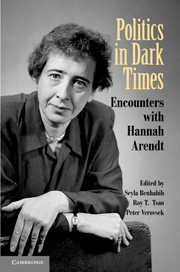Book contents
- Frontmatter
- Contents
- Notes on Contributors
- Introduction
- Part I Freedom, Equality, and Responsibility
- 1 Arendt on the Foundations of Equality
- 2 Arendt's Augustine
- 3 The Rule of the People: Arendt, Archê, and Democracy
- 4 Genealogies of Catastrophe: Arendt on the Logic and Legacy of Imperialism
- 5 On Race and Culture: Hannah Arendt and Her Contemporaries
- Part II Sovereignty, the Nation-State, and the Rule of Law
- Part III Politics in Dark Times
- Part IV Judging Evil
- Index
- References
3 - The Rule of the People: Arendt, Archê, and Democracy
Published online by Cambridge University Press: 05 June 2012
- Frontmatter
- Contents
- Notes on Contributors
- Introduction
- Part I Freedom, Equality, and Responsibility
- 1 Arendt on the Foundations of Equality
- 2 Arendt's Augustine
- 3 The Rule of the People: Arendt, Archê, and Democracy
- 4 Genealogies of Catastrophe: Arendt on the Logic and Legacy of Imperialism
- 5 On Race and Culture: Hannah Arendt and Her Contemporaries
- Part II Sovereignty, the Nation-State, and the Rule of Law
- Part III Politics in Dark Times
- Part IV Judging Evil
- Index
- References
Summary
Perhaps the very fact that these two elements, the concern with stability and the spirit of the new, have become opposites in political thought and terminology…must be recognized to be among the symptoms of our loss.
Hannah ArendtArendt and the Paradox of Rule
“Democracy,” writes David Held, “means a form of government in which, in contradistinction to monarchies and aristocracies, the people rule.” One important kind of democratic theory is devoted to filling in the details of this basic formula and to debating the merits of the resulting array of models of democracy: classical, modern, direct, representative, participatory, minimalist, deliberative, aggregative, and so on. Another important kind of democratic theory, however, lingers over the “elementary idea” of democracy itself, exploring problems that lurk in and behind its basic terms. Lately, for instance, many democratic theorists have been preoccupied with the fraught idea of “the people,” asking what sorts of things peoples are and how their boundaries are to be settled. This is a question about identity; about who the people are. There is, however, an equally vital but relatively neglected question to be asked about activity – about what the people do. What does it mean to say that in democracy the people rule?
In mainstream democratic theory, the term rule has received relatively little attention, not because it has been thought to be unimportant, but because its meaning has seemed comparatively straightforward. To “rule,” Webster's tells us, means “to have power or command,” to “exercise supreme authority,” and “to exercise control.” To say that democracy is a form of rule, then, is just to say that it is one distinctive way of arranging the institutions and practices through which authoritative decisions are made and executed in a polity. One important strand of democratic theory, however, throws the idea of rule as such into relief, and it does so by drawing in an unexpected way on a species of antidemocratic polemic. From classical Athens onward, critics of democracy have argued that because the people are nothing but a formless multitude, incapable of government, their rule would in effect be no rule at all, but monstrous disorder. Many democratic theorists respond to this charge by straightforwardly defending the people's qualifications for rule, but some refuse to accommodate themselves to the terms of this critique. Sheldon Wolin, for example, has famously proposed “accepting the familiar charges that democracy is inherently unstable, inclined toward anarchy, and identified with revolution, and using these traits as the basis for a different, aconstitutional conception of democracy.” Skeptical of the very idea of democracy as a regime, Wolin reminds us that subjection inhabits every form of rule, even those in which we exercise considerable control over our rulers, or rule ourselves; and he warns that, in conceiving of democracy as a system of command and obedience, we risk sacrificing the spirit of insubordination that animates it.
- Type
- Chapter
- Information
- Politics in Dark TimesEncounters with Hannah Arendt, pp. 58 - 82Publisher: Cambridge University PressPrint publication year: 2010
References
- 3
- Cited by



